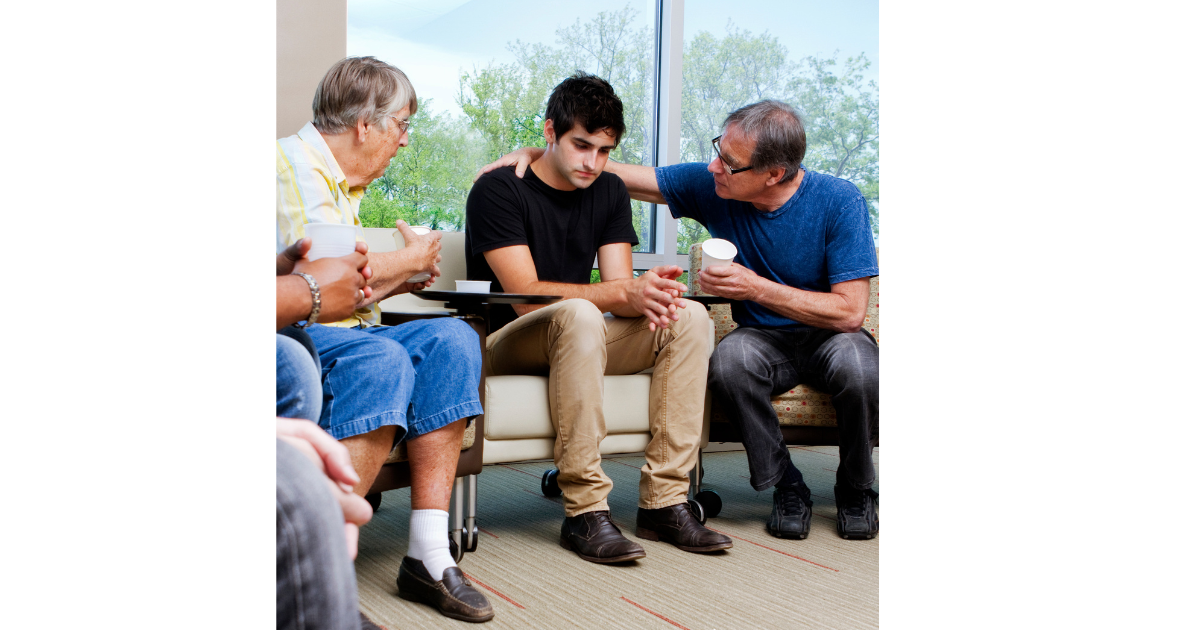According to the National Institute on Alcohol Abuse and Alcoholism, more than 15 million adults in the United States meet the qualifications for an Alcohol Use Disorder. That’s nearly 6.2% of the adult population. Chances are, you’re either close to or know someone who struggles with alcoholism. Watching a friend, family member, or co-worker struggle with the difficulties of alcohol use disorder can be incredibly difficult, and you may think about the ways you can help.
While it’s ultimately up to the person afflicted with this disease to seek the help they need, there are ways that you can be encouraging and assist them on the path to recovery. Early treatment and intervention are vital to helping someone on their journey to sobriety. Here are some steps you should take if you’re concerned about the safety and wellbeing of someone close to you who may be suffering from alcoholism.
What is Alcoholism?

Before you can help an alcoholic, it’s essential that you understand the mechanisms of how alcoholism works. Alcoholism is a complex disease of the brain, and according to the National Institute on Drug Abuse (NIDA), addiction is classified as a chronic and relapsing brain disease in which substance use becomes an involuntary habit despite all negative consequences that may ensue. Alcoholism has a strong genetic component and is also influenced by a person’s environment, meaning alcoholics have little control over how strong their addiction is. You can read more about the signs of an alcoholic here.
Alcoholism is more than just social drinking or occasional drinking. It typically begins as a coping mechanism for dealing with social, work, or relationship pressures and gradually becomes a crutch on which alcoholics rely. Alcoholism is not something that can just be turned on and off or avoided. The disease exists, and people afflicted with it are forced to either confront it head on or allow it to consume their existence. Before you help an alcoholic to get better, you have to understand that they have lived with this disease for their entire life and that there is no “cure,” only a holistic lifestyle change that removes alcohol from their lives. You can do further research into the disease of alcoholism by checking out online resources such as:
- Al-Anon
- Alcoholics Anonymous
- Substance Abuse and Mental Health Services Administration
- National Institute on Alcohol Abuse and Alcoholism
Recognize Signs of Codependency in Alcoholism
Codependency is a relationship dynamic that often occurs among alcoholics and their loved ones. In a codependent relationship, typically one person becomes dependent on the other’s approval (usually the alcoholic) to feel any sense of validation. This often happens when someone grows up feeling like they were neglected or abused by their parents, possibly having one or both parents be an alcoholic, and continues into adulthood. Children that grow up this way feel as though they need to subvert their own needs and desires to please a difficult or distant parent, and they seek out this relationship well past childhood. Signs that you may be in a codependent relationship include:
- Inability to find satisfaction outside of satisfying your partner’s needs in the relationship
- Recognizing unhealthy behaviors or modes of thinking in your partner but remaining silent to keep the status quo and not displease them
- Providing emotional, financial or other modes of support to the other person despite the negative consequences to oneself
- Anxiety when feeling unable to please or conform to your partner’s wishes
- Making excuses for your partner’s behavior while trying to change the person
- Neglecting your hobbies and desires in favor of your partner’s
- Feeling anxious, burnt out, exhausted, or guilty with no specific cause
People in codependent relationships with alcoholics will experience a significant decline in their mental, emotional, and physical health. Before you can help your alcoholic, you’ll need to identify whether you are in a codependent relationship and do some self-exploration. People in codependent relationships with alcoholics may rely on the alcoholic for more than just emotional support. If you are dependent financially or even afraid of physical violence if you attempt to help the person’s alcoholism, you should consider getting someone else to approach your alcoholic.
What to Say to An Alcoholic

Before you have the discussion with your alcoholic about how you feel and what options may be best for their treatment, you should rehearse what you’re going to say and make sure it follows a few guidelines. The main goal should be showing that you support your alcoholic getting better, but that you are not coming from a negative or critical place. For example, instead of saying “you’re an alcoholic and you need to get help,” you could say “I love you and am concerned for your well being, I don’t want you to hurt yourself from drinking too much.”
Approaching this subject can be difficult because many alcoholics are in denial or ashamed of their addiction. You should be affirmative, but not overly confrontational. Keep the conversation simple and explain an exact situation that made you feel like their drinking is a problem. You are truthful in retelling not only the events that happened but also the emotional truth of how they made you feel at the time. Express love when you are trying to articulate why you think they should get help. You should also prepare some possible options for the person to consider such as therapy, residential treatment, intensive outpatient, etc.
How to Support An Alcoholic
This step is one of the most important because it helps your addict structure their recovery with actual actions. You can’t force someone to go into treatment if they don’t want to or are not ready. What you can do is give support by listing resources and referrals for treatment options as well as offering to drive them there. You can offer them dog sitting or house sitting services or provide your phone number as a hotline if they ever need help right away. You should also talk with other friends and family members to see if they can lend support during your alcoholics time of need.
Although they may attempt to rationalize their addiction and promise to cut back or significantly reduce their drinking, you should actively encourage them to enter into a formal treatment program. Recovering addicts have many options at their disposal when it comes to finding the right treatment pathway. Some of the most common include:
- Residential Treatment
- Intensive Outpatient
- Medical Detoxification
- Partial Hospitalization
- Counseling
- Alcoholics Anonymous
- Al-Anon
Stage an Alcohol Intervention

Despite all our best-laid plans, sometimes having a one on one discussion isn’t enough. If you have talked to your alcoholic and offered your support and they still decline help, it may be time to learn what’s an intervention, as well as how to plan one. An intervention is a carefully planned process by which friends and family of an addict may confront that person about their addiction. It involves meeting at a pre-arranged date and time and most often is done without letting the addict know until the moment it begins. Friends and family are then encouraged to express their feelings and concerns towards the afflicted person’s condition in a positive and structured manner. The most successful forms of intervention usually involve a significant amount of forethought and careful planning towards structure, what people plan to say, and the next steps following the intervention. You can learn more about how to stage a response here. Some important guidelines to follow when staging an intervention include:
- Rehearse beforehand
- Gather close friends and family only
- Be positive and affirmative
- Stick to an agreed-upon order for speaking
- Do not harass the addict
- Make sure the addict is as sober as possible
- Have specific resources and options for them
- Have a backup plan
Even if your intervention does not go exactly the way you intended, you should continue to try and assist the addict in getting the help that they need. If needed, you can enlist the services of a certified intervention specialist who can guide you through the process, offer the first-hand experience, and recommend trusted caregivers.
Continue to Support Their Addiction Recovery
The continued support of friends and family is one of the most critical aspects of successful recovery from alcoholism. The fight against alcoholism does not end once a person enters treatment, as the person will need ongoing love and support to stay on track. While they are in treatment, you can help by sending them letters of encouragement, taking care of their possessions or pets while they are gone, and finding therapists and counselors for post-release help.
Once they have finished their course of treatment, you can help set them up with a counselor or therapist and provide them with information on local AA meetings. If you are a family member of the addict, you can even attend family therapy together. Alcoholism is commonly known as a “family disease” because of the complex relationship dynamics that can fuel it. If you are not a family member, you can still attend local Al-Anon meetings that provide support and informational resources for people who have relationships with alcoholics. Some other ways you can support are:
- Get rid of alcohol in their house
- Offer to hang out or participate in regular sober activities
- Offer rides to and from the treatment center
- Attend visiting hours while they are in treatment
Although treatment eventually ends, staying sober is a lifelong process that requires ongoing support from friends and family. You can find activities that do not involve alcohol consumption and help them adhere to a relapse prevention plan.
Next Steps
If you’re seeking help organizing an intervention for a loved one suffering from alcoholism, don’t hesitate to seek out the assistance of trained professionals. If you’re looking for alcohol rehab, Landmark Recovery provides drug & and alcohol recovery centers in nine states that help addicts take the first steps towards achieving and maintaining sobriety. Our caring staff is trained in residential treatment, individual and group therapy, as well as intensive outpatient and detox treatment.

Choose Recovery Over Addiction
We're here 24/7 to help you get the care you need to live life on your terms, without drugs or alcohol. Talk to our recovery specialists today and learn about our integrated treatment programs.




